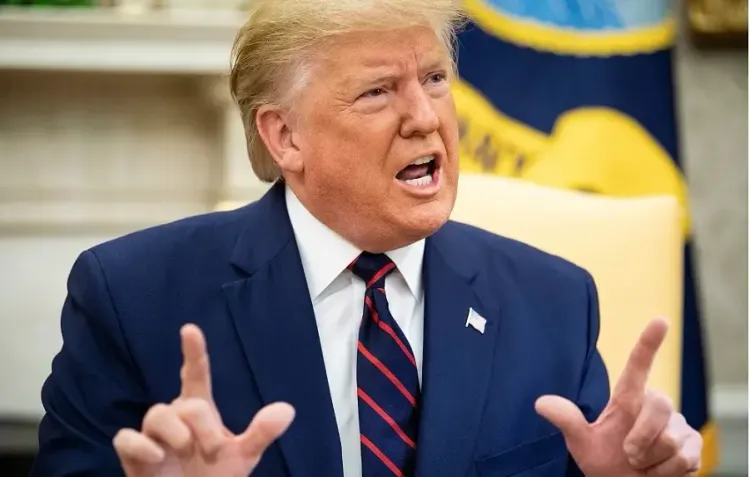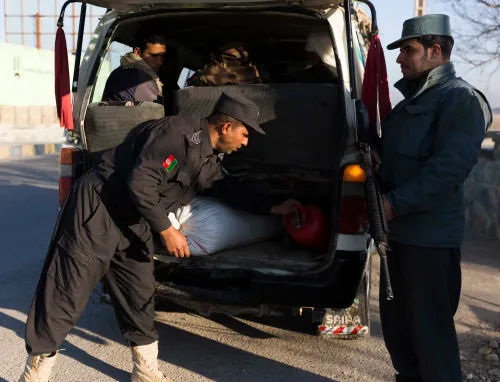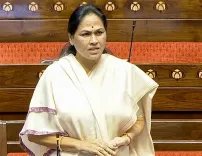Trump Announces Reversal of US Oil Concessions with Venezuela

Synopsis
Key Takeaways
- Trump is reversing oil concessions made by Biden.
- The decision follows unmet electoral conditions by Maduro.
- Concerns over undocumented Venezuelan criminals influenced the decision.
- Trump ordered the termination of the Biden 'Concession Agreement'.
- Venezuelan officials criticized the move as harmful.
Washington, Feb 27 (NationPress) President Donald Trump has announced that the US will be reversing "concessions" on "the oil transaction agreement" with Venezuela under the Biden administration. This decision comes in response to the unmet electoral conditions set by Venezuelan President Nicolas Maduro and a growing frustration regarding the slow process of deporting violent undocumented Venezuelan criminals back to their homeland.
"I am therefore ordering that the ineffective and unmet Biden 'Concession Agreement' be terminated as of the March 1 option to renew. Thank you for your attention to this matter!" he stated on Wednesday via Truth Social.
In a social media update on Wednesday, Trump criticized the Maduro administration for failing to make significant strides in areas such as election reform and immigration enforcement.
"We are hereby reversing the concessions that Crooked Joe Biden granted to Nicolas Maduro, of Venezuela, concerning the oil transaction agreement dated November 26, 2022, as well as the electoral conditions within Venezuela, which the Maduro regime has not fulfilled," Trump remarked in his post.
This action is part of the Biden administration's strategy to relax some restrictions on financial dealings with Venezuela, particularly in the oil sector, amidst ongoing dialogues between the Maduro government and the Venezuelan opposition aimed at fostering free and fair elections. However, some sanctions were reinstated after Maduro obstructed the Opposition candidate, Maria Corina Machado, from running in the presidential election.
In 2022, the Biden administration permitted US energy giant Chevron to broaden its production activities in oil-rich Venezuela.
At that time, the US was cautiously working to mitigate tensions with the Maduro administration, partly hoping to encourage more cooperation regarding energy.
Then, in October 2023, officials from Maduro's administration signed a pair of agreements known as the Barbados Agreement, which reaffirmed its commitment to conducting free and fair elections under the supervision of international election experts.
While Trump does not specifically mention Chevron, the Biden administration had granted Chevron the authority to "resume limited natural resource extraction operations in Venezuela", as stated by the Treasury Department at that time.
Trump declared that this authorization would not be renewed on March 1 as it typically would be, but rather terminated.
Venezuelan Vice President Delcy Rodriguez criticized what she described as Trump's "damaging and inexplicable decision". She remarked, "The US government has made a damaging and inexplicable decision by announcing sanctions against the US company Chevron. In its attempt to harm the Venezuelan people, it is in fact hurting the United States, its population and its companies, and also calling into question the legal security of the US' international investment regime," in a statement.
The Trump administration has also expressed intentions to detain Venezuelan immigrants at Guantanamo Bay, a military base notoriously known for its role as a detention and torture center during the so-called war on terror.
Although the government labels the Venezuelans held there as gang members and dangerous criminals, many lack serious criminal records, aside from immigration-related charges.
Several members of Trump's current foreign policy team have a long-standing history of hawkish rhetoric regarding Venezuela, with some even expressing desires to replace the Maduro regime with one more aligned with US interests.










